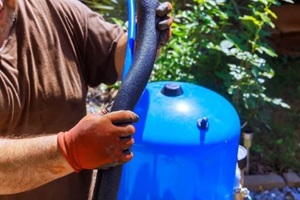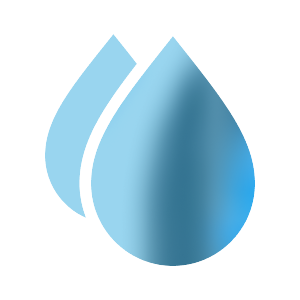
Clean, reliable water starts with a well system that is properly maintained. A well pump that is left unchecked can lead to unexpected breakdowns, costly repairs, and water quality issues later on.
Regular well inspections keep your system performing at its best, help extend the life of your equipment, and protect the safety of your water.
Annual Inspections Keep Your System Performing
Organizations such as the CDC and the National Ground Water Association (NGWA) recommend annual inspections by a licensed or certified professional. The visit is more than a quick check; it’s a full evaluation of the entire system to catch problems early and keep your water supply dependable.
During the inspection, a professional will conduct performance tests by measuring flow rate, water levels before and during pumping, and motor performance, including amp load, grounding, and line voltage.
The pressure tank and pressure switch are reviewed for proper cycling, and the system is checked for sanitary compliance and adherence to local codes. A targeted water test for coliform bacteria and nitrates is performed, with additional testing for elements like iron, manganese, or hardness if local conditions warrant it.
Your inspection should conclude with an in-depth report that includes current findings and year-over-year performance insights.
Seasonal Checks That Protect Performance
Between annual visits, a spring check helps maintain system reliability. The CDC recommends a simple mechanical review each spring to detect early signs of wear or damage that may have occurred during winter weather, particularly if your area experienced winter outages or significant storms.
During this quick look, confirm the wellhead is secure, inspect visible components for damage, and check the area around the well for debris or surface runoff issues. Seasonal maintenance like this helps identify problems before they grow into service calls.
Water Testing For Health and Safety
Safe water depends on consistent testing. Health authorities, including the CDC and the EPA, recommend that laboratory testing of well water be conducted at least once a year.
The standard annual test includes total coliform bacteria, nitrates, total dissolved solids (TDS), and pH. Depending on your area, you may need additional testing for arsenic, lead, or other local contaminants.
For homes with infants, elderly family members, or anyone with specific health needs, increasing testing frequency is recommended. Results from these tests help you make informed decisions about filtration, treatment, or other upgrades to maintain safe and healthy water.
Thorough System Review Every Five Years

Every five years, a deeper inspection gives you a complete picture of your system’s health. The Water Systems Council recommends a full review of the pump, drop pipe, pitless adapter, storage tank, valves, and overall flow performance.
The inspection is more thorough than the annual visit and often involves disassembling or inspecting components that are not reviewed during standard maintenance.
Comparing current performance data to your maintenance records helps identify trends like gradual drops in flow or changes in pump efficiency. A proactive review like this extends equipment life and reduces the chance of emergency service calls.
Situations That Call For Immediate Attention
While annual schedules are dependable, certain situations may require you to promptly request service. Any noticeable drop in water pressure or flow, frequent cycling of the pump, cloudy or discolored water, or sudden changes in taste or odor should prompt an immediate inspection.
If your water tests positive for bacteria, don’t delay in scheduling professional service and disinfection. Another instance where a call is needed is after the well cap or seal has been opened for repairs or maintenance. Even routine work creates opportunities for contamination and should be followed by inspection and testing.
Special Events That Change Your Maintenance Routine
Certain events demand extra attention to keep your well system safe and reliable. Flooding is a major concern; if your well becomes flooded or you suspect contamination, avoid using the water until a licensed professional disinfects the system and post-flood testing confirms safety.
Drought or periods of heavy seasonal use can also strain the system, as low groundwater levels may reduce pump performance and increase wear. If you notice lower pressure or slower recovery times, schedule an interim inspection to prevent damage to the pump and related components.
Simple Checks You Can Handle
Between professional visits, basic homeowner inspections help maintain your system. Take a few minutes several times a year to do a walk-around of the wellhead.
Look for a secure and intact sanitary cap, tight conduit, and a clear vent screen. Make sure the ground slopes away from the casing to keep surface water from pooling, and check that no chemicals or hazardous materials are stored nearby.
Keep vegetation, especially trees with large root systems, at least ten feet away to avoid root intrusion.
Maintaining a well log and organizing inspection and testing reports is equally important. A clear maintenance record simplifies future service and helps professionals provide accurate recommendations.
Keep Your Well Pump Running Strong with Tri-County Pumps

Regular inspections and consistent maintenance keep your well pump operating efficiently and your water safe. Staying on top of annual checks, seasonal walkthroughs, and water testing helps prevent costly breakdowns and extends the life of your system.
Backed by 30-plus years of expertise, Tri-County Pump Service, Inc. continues to support customers in Maryland, Virginia, and West Virginia with exceptional service they can depend on. Our licensed technicians handle everything from quick seasonal inspections to full system evaluations, giving you clear answers and trusted solutions every step of the way.
If it’s time for your annual inspection or you’ve noticed changes in water pressure, taste, or quality, let us help you keep everything running smoothly. Reach out to us by calling 1-(301)-783-0038, scheduling your service online, or using our contact form to initiate the process.



